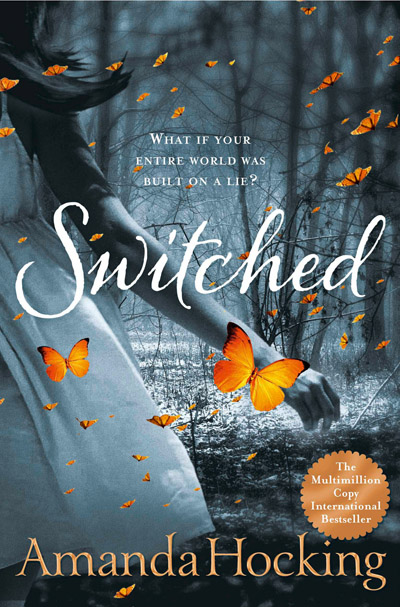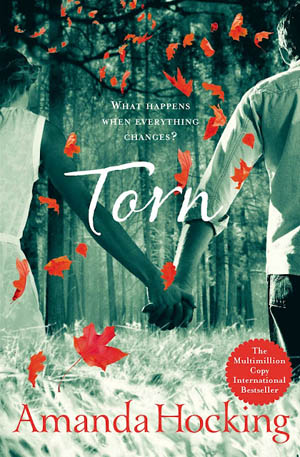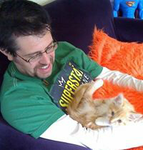Trolls Can Be Sexy: Author Amanda Hocking Is Switched On
After writing 17 novels and self-publishing most of them online, Amanda Hocking built up such a vast fan base, the book publishers came knocking
After writing 17 novels and self-publishing most of them online, Amanda Hocking built up such a vast fan base, the book publishers came knocking

Young-adult supernatural romance author Amanda Hocking is one of the most experienced and successful first-time novelists around. A few years back, that phrase would have been nonsense, but now, thanks to the internet, it makes a crazy kind of sense. Because Hocking wrote 17 books before she got her first publishing contract, published most of them online in the form of ebooks, and built up a massive fanbase in the process.
What this also means is that her book series out in paperback format, The Trylle trilogy, doesn’t require a massive gap between the publication of each instalment. They’ve already been written, so her publishers are wasting no time getting this quirky, pacy series onto the shelves. The first book, Switched , in which a girl called Wendy discovers that she’s a changeling troll with a scary inheritance, has just been published, with the second book, Torn , due out on 1 March and the concluding tome, Ascend , on 26 April. Yep, you can pre-order the entire trilogy now.
SFX : You’re one of a growing list of young authors who have broken into “proper publishing” by self-publishing. Is this some sort of new wave of literary communism, breaking the publishing power block?
AH: “I know, I think it gives writers more options and more control which is great and I think the publishing industry might needed a little shake-up I guess. I think publishers have a place too, obviously.”
Did you actually try to get published previously or did you turn straight to e-publishing?
“I tried to get published before. I mostly submitted letters to agents because most publishers don’t take unsolicited material so there was probably eight years before I started self-publishing.”
Sign up to the SFX Newsletter
Get sneak previews, exclusive competitions and details of special events each month!
Can you remember what the agents were saying, what advice they were giving you?
“Most of them were just standard letters saying like ‘Not for us’ and ‘Best of luck’, that sort of thing. A couple of agents gave me notes on Switched , and I tried to implement them a bit.”
You went the route of e-publishing and were massively successful. How many books had you written?
“I’d written 17 books but I only self-published nine or ten, I think.”
You’re still only 27, so that’s an impressive output. How fast do you write?
“I write pretty quickly, it normally takes me two to four weeks to write a book.”
That’s incredibly fast.
“Yeah.”
Do you have everything plotted in your head when you start or do the characters take it where they’re going to take it?
“I outline, a lot. I think that helps me write so quickly.”
With something like the Trylle series would you have the entire trilogy in your head before you start?
“I had the over-arcing themes, but when I wrote the first book I only had the first book outlined and major plot points for the second book and some for the third one. The further away I am from a book, the less I have of an outline.”
The Trylle trilogy centres on trolls. Where did the inspiration to use trolls come from?
“This series is kinda based on Scandinavian folklore. Trolls are big in general over in Scandinavia, and most of them are the kind you normally think of as trolls. But they had some which are really beautiful, though they were mean and ill-tempered, and they practised using changelings and they had the power to trick people into giving them what they wanted. That was the whole ground work for the whole series.”
Was it also a case of finding something new and supernatural to write about, with vampires, werewolves and zombies so overused now?
“Yeah, that was the case too. I knew I enjoyed writing about the paranormal but I didn’t want to write about the things that were already being written about.”
The teenager who discovers they have a secret, supernatural heritage they didn’t know about is a standard trope within fantasy. How do you go about making sure you don’t fall into the clichés?
“I really just tried to be true to how things actually were, in a way. A lot of times in fantasy somebody finds out they’re a princess and everything is magical and wonderful. And in reality if you have a monarchy with a princess that means that there are going to be servants, and classes and people are put upon. It isn’t going to be some magical fairyland. Usually the end of the story is finding out you are a princess and going home. In this trilogy, that’s just the beginning. It’s not always a happy ending.”
Wendy, the girl in the trilogy who discovers she’s a troll, has uncontrollable hair, which you go into with gleeful detail. Do you have uncontrollable hair? Was it a frustration you needed to vent?
“No! My hair is just flat and straight and stuff. It was just one of the ways to tell you’re a troll in the old folklore – they had really curly and unmanageable hair.”
I found a quote from the New York Times that says your books are, “Literature as candy, a mash-up of creativity and commerce.” Is that praise or criticism?
“I take it as a compliment. I’m sure there are people who’d take it as a criticism. I think that it’s a fairly accurate statement. I set out more to be an entertainer than an artist. This is entertainment... that’s how I feel about it.”
When you were e-publishing were you actively marketing your novels online?
“In the beginning I didn’t know what to do. I had a blog, a Facebook page and a Twitter account, but I had no followers or anything. I posted some stuff about it and nobody really read it. Then I became active in writing forums and the book blogger community online. People started reviewing it and talking about it and it became a word-of-mouth thing.”
Going by that route, do you feel you have more of a connection to your readership?
“I think I do. My readership is very important to me and I interact with them as much as I can, I think that is one of the things that has been able to make my book stand out because my readers felt more connected to me and talked about it to promote it.”
More of this interview on the next page

You're on record as saying the Trylle trilogy is the favourite of your books.
“It is, yeah.”
Why is that?
“I don’t really know, exactly. I felt when I was writing it, that this would be it – this would be the one that opened doors. It just feels like something special to me, without there being anything in particular about it. Whilst I always felt it could be my break-out book, I’m surprised by how much it did take off.”
Was it the first you wrote?
“No, I think it was the fourth one. I had three other books that were about vampires. Those ones I kind of knew I wouldn’t find publishers for because they were about vampires and there is so much vampire stuff around. ”
The published, paperback version of Switched comes with a new short story and an interview with you at the back. But is there any extra material within the novel itself?
“Yeah, there is. In editing it, there were things that I thought I should have included or expanded on a little bit more. It’s usually a couple of sentences switched around. They are not major changes but they are enough changes that I think make the book shine more.”
Are you working with an editor on the books now?
“Yes. I had an editor before when I was self-publishing and I think they did a good job but it was hard for me to get the editorial help that I was looking for. Now, I have an excellent relationship with my editor. She really knows how to make the books shine and she suggests things that strengthen it. But she doesn’t want to change too much and if I say, ‘I think this should stay,’ she’s fine with it. I’m not being forced to make any changes which is good.”
“Oh, I would love it if Michael Giacchino. He does all the JJ Abrams stuff.”
Do you think, "What would this look like on the big screen?" Do you have scenes in your head?
“Yeah, I do. In the third book there is a lot more fighting, and fighting is a lot better to see than to read about. A lot of things are better to read but fighting I prefer to watch on screen.”
As young adult, supernatural romances your books are clearly aimed at teenage girls, but have you been surprised by discovering people outside that demographic reading them?
“A little bit, yeah. The majority of my readers are women – 50% are adult women, in their twenties, thirties and forties and I was surprised by that. There are also a lot of men who are reading it. Which I’m pleased with, but when I was writing it I wasn't expecting it.”
What do you think makes a good romantic male lead in a book?
“People seem to enjoy somebody who is really restrained. I think restraint can be very sexy. Women, when they see a man that’s quiet, they think he’s got a lot going on and that he’s hiding some deep emotions and stuff. That seems to draw a lot of readers in.”
Some of your other e-published work is much more in the horror tradition, isn’t it?
“I’ve written horror about zombies. It was very actionful and very gory. A lot of Young Adult books have monsters in them – and vampires – but there’s no blood. They’ll talk about it but mostly they’re very romantic and sexy and nuanced. But a monster has to be monstrous. Especially in other books I’m working on, I don’t shy away from gore if I think it’s for the purpose. I don’t just write slasher books but I like monsters and I like actually making them dangerous and horrible.
“The super-weird thing is, my zombie books, I wrote them for a little older audience; they’re still Young Adult but more like 17 and older. So I get really gory and there is some bad language. And towards the end of the book there is a sex scene. It’s very not graphic, but I had people complain that kids were going to read, and they thought it was suitable it for their kids apart from the sex scene. It’s zombie murder for 90% of the book and that is totally fine, apparently... but one little sex scene…!”
So what of the future?
“I’ve got a brand new series coming out later this year.”
What can you tell us about it?
“It’s called the Water Song series. The first book is Wake and it is coming out in August. It’s based on Greek mythology and it’s about two sisters who get involved with some dangerous paranormal element. They fall in love and have adventures and grow up and that kind of stuff.”

Dave is a TV and film journalist who specializes in the science fiction and fantasy genres. He's written books about film posters and post-apocalypses, alongside writing for SFX Magazine for many years.


